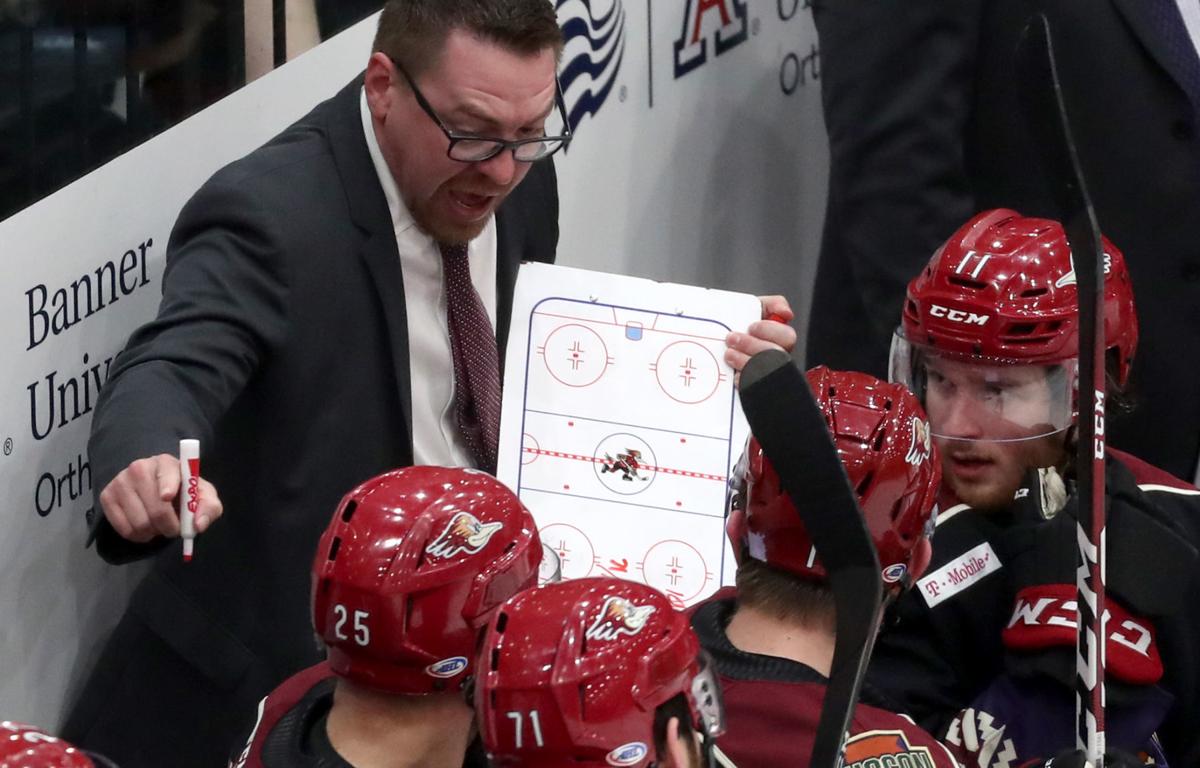The more the sports landscape sits still, the more Jay Varady is trying to do what he’s always done: build a routine, and stick to it.
“We’re making it through like everybody else … just trying to find a little routine in our day,” Varady said Wednesday during a video conference call — the first opportunity for local media to hear from the second-year Tucson Roadrunners head coach or players since the American Hockey League went on hiatus March 11.
Varady said his routine means “Get up, work out, try to get some hockey in our day somehow.”
For coaches, Varady noted, the realities of stay-at-home or work-from-home orders may not be all that different from the typical offseason schedule.
“I think for us, maybe different than others,” he said, “we go into kind of a pattern that we’d assume in the offseason.”
Offseason. There’s that word again.
Holed up in Everett, Washington, where his family makes their year-round home, Varady may very well build his days to mimic what happens when the season concludes. That includes calls with players, connecting with management of the NHL’s Arizona Coyotes (the Roadrunners’ parent club), watching video, and conducting other research.
But that doesn’t mean Varady — head of a team that sat in first place in its division with a 36-19-1-2 record, carried a top-five league record overall and was all but assured of its second-ever Calder Cup playoff berth — is ready for the 2019-20 season to actually be over.
“I think you always have to stay optimistic that we’re going back because if you don’t stay ready and then we do, then you’re in trouble,” he said adding that even with that optimism, he doesn’t have any more knowledge than anyone else as to the viability of a return for the AHL, NHL or any other league. “By activating your brain, staying in shape, getting a workout in, doing those things … you’re ready for whatever’s going to come at us. That was always our approach during the season: get up, come to the rink, be ready.”
But what happens when there’s no rink to go to?
With public ice rinks temporarily shuttered nationwide — the Tucson Arena ice was removed last week to help the facility save in upkeep costs during the current pause — AHL and NHL players are forced to keep the skates off and focus almost on entirely on off-ice training.
Forward Hudson Fasching, announced just this week as the Roadrunners’ IOA/American Specialty Man of the Year for his off-ice contributions to the Tucson community — an honor doled out to one player on all 31 AHL teams, with the league later announcing a league-wide recipient of the honor — also spoke Wednesday.
Fasching, whose 19 goals through 57 Tucson games this season were the most in any of his four-plus professional season, is one the few Roadrunners’ skaters still in Tucson for the time being. Fasching said he’s getting advice on off-ice conditioning from Roadrunners’ strength and conditioning staff.
But even that has its limits, Fasching said.
“I’m just trying to keep busy and try to stay in shape the best I can here,” Fasching said. “I’m just spending a lot of time with my dog and my wife, and it’s kind of good to just have some time at home.”
Asked Wednesday how much time AHL clubs would need to prepare to start their season back up, Varady admitted he’s not sure he has an answer to that, either.
“I don’t really know what the answer to that is. Someone’s going to tell us how long we have to be ready,” Varady said with a brief chuckle.
“It’s like the schedule. They give you the schedule, and they tell you to go San Diego, and you get on the plane and you go to San Diego and play.
“If we come back to play, someone’s going to tell us, “hey, you’ve got two weeks of training camp, and let’s go.
“It’s not like a summer training program where you can advise the guys to get on the ice earlier,” Varady added. “We’re all going to look at each other and say, OK, here we go. Here’s the plan.”





